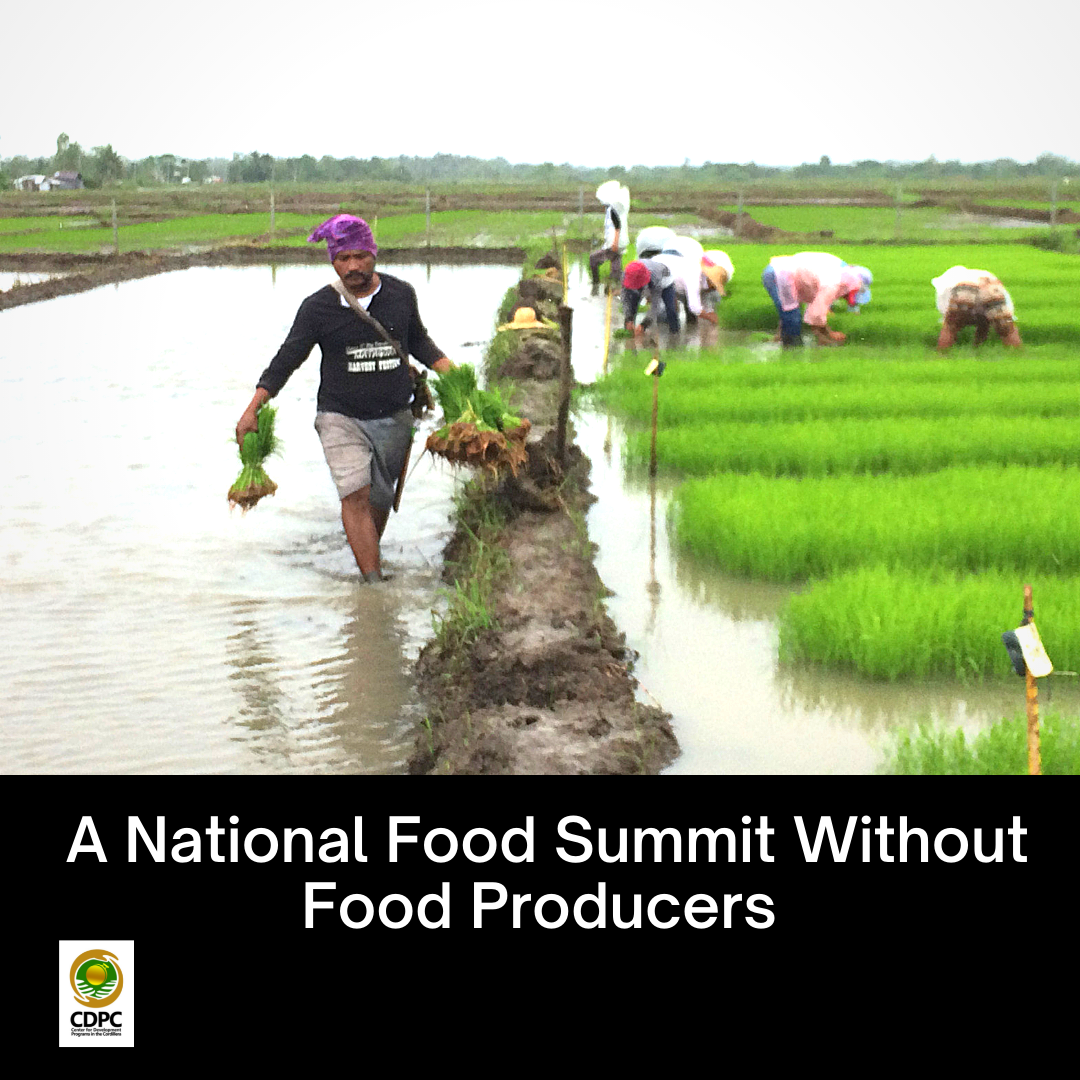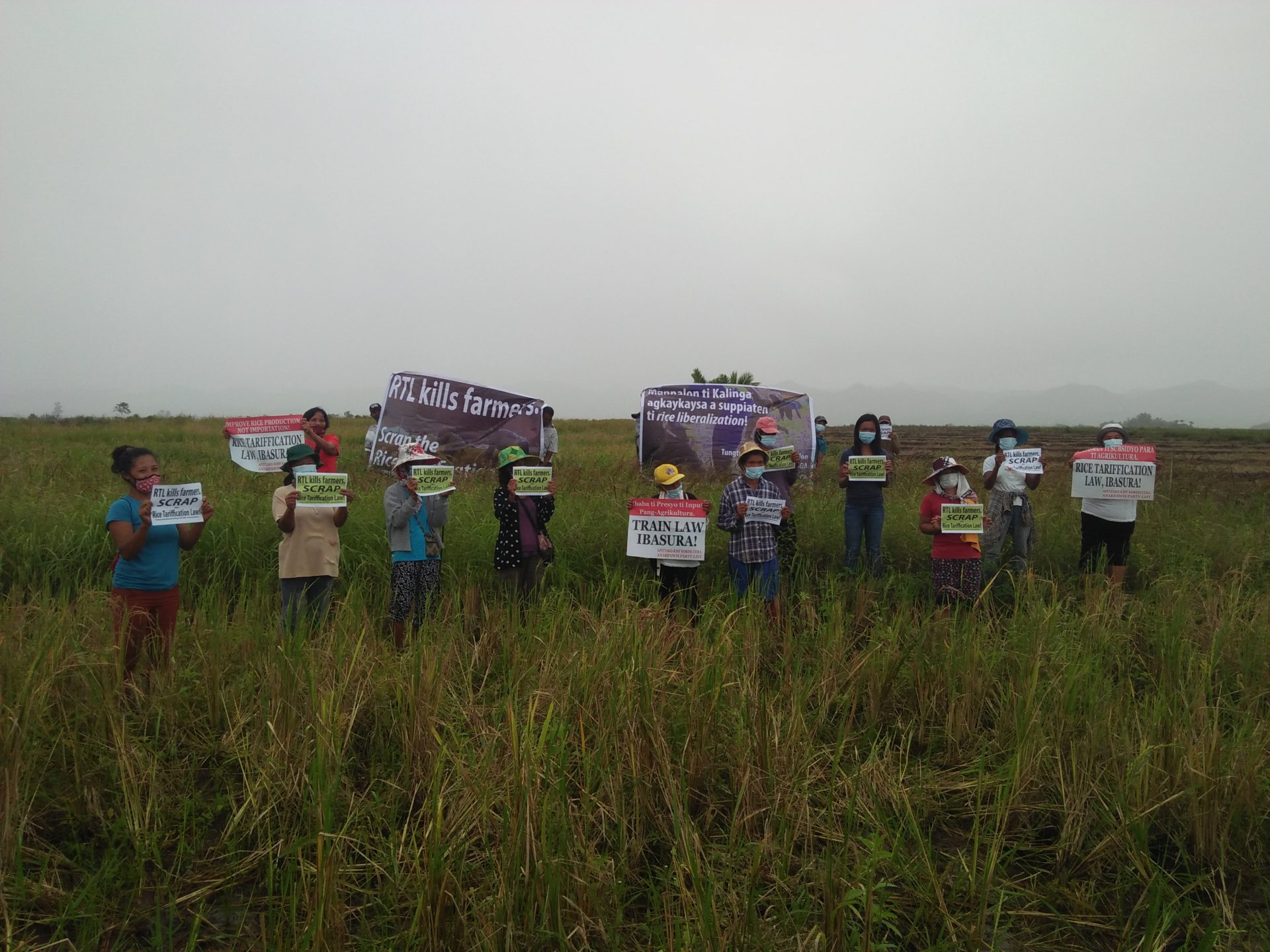
“Ang food security ng Departamento ng Agrikultura ay hindi kailanman dumating sa lamesa ng katutubong mamamayan… Suportahan ang pagtatanim ng mga katutubo sa mga produktong kapakipakinabang, suportahan ang aming pagdepensa sa mga kagubatan at kailogan… Irespeto ang karapatan sa aming lupang ninuno (The food security program of the Department of Agriculture has never reached the tables of indigenous peoples… Support the agricultural production of essential crops by indigenous peoples, support our struggle in defense of our forests and rivers, respect our right to our ancestral lands).”
This was the lament of Kakay Tolentino, an indigenous Dumagat and spokesperson of BAI-Indigenous Women’s Network who called for support during a press conference by various organizations co-organized by AgroecologyX network to boycott the Department of Agriculture’s National Food Summit on May 18-19. AgroecologyX and numerous farmers’ organizations and federations and advocates are boycotting the Summit for the reason that their opinions and demands in attaining food security were never taken into consideration.
With the theme “Food for Today and Beyond: Transforming Philippine Agriculture,” the Summit is intended to discuss urgent concerns affecting the agriculture sector and present the “New Normal” direction of the Department.
But there is clear reason to be convinced that the Summit will not consider the demands by organized farmers pertaining to achieving food security. None of the resource persons are from the sector of actual food producers and consumers as well as those in other sections of the food supply chain. Neither are representatives from the Lower House’s Makabayan block invited, considering they filed two relevant House Bills on genuine agrarian reform and rice industry development.
Instead, apart from DA officials, the list of resource persons include legislators Senator Cynthia Villar – Chairperson of the Senate Committee on Food and Agriculture, Congressman Leo Rafael Cueva – chairperson of the House Committee on Aquaculture and Fisheries Resources and Congressman Wilfredo Mark Enverga – House Committee on Agriculture and Food, Cabinet officials and government technocrats, university professors, Local Government Officials, an outstanding rural woman awardee, two organizations of fisherfolks, Aboitiz Equity Ventures that is engaged in agri-business and AGREA, a TESDA (Technical Education and Skills Development Authority)-accredited farm school. The Director General of the Food and Agriculture Organization (FAO), Qu Donghu, will also be speaking.
Let us take a look at what the agriculture groups boycotting the Summit have repeatedly forwarded but have been repeatedly disregarded.
Genuine Agrarian Reform Bill
The Genuine Agrarian Reform Bill (GARB – HB 555), filed by AnakPawis Party-list in the 17th Congress and supported by Kilusang Magbubukid ng Pilipinas, acknowledges that landlessness and foreign control remain the root causes of widespread poverty or food insecurity in the language of the Food Summit. As a response, the GARB aims to “implement free, fair, just and equitable distribution of lands… within a five-year period and eliminate all forms of oppression and exploitation… thereby usher the advent of genuine social justice.”
The GARB puts forward all agricultural lands (not limited to rice and corn lands) to be subjected to land reform, with 5 hectares to be retained and operated by the landowner and the rest to be distributed to tenant-farmers at a maximum of 5 hectares per beneficiary. Further, the bill seeks to turn over to the Philippine State foreign-controlled agri-business enterprises or to grant to the farm workers through their cooperatives. Commercial farms and agricultural estates owned by Filipinos shall similarly be subjected to land distribution under the same process of State expropriation and land distribution. Landowners shall be compensated by the State. Farmers shall be provided support services to ensure viable production and increased income. Cooperativization shall be promoted.
In a report by World Bank entitled “Transforming Philippine Agriculture, During Covid-19 and Beyond (June 2020),[1] the average farm size of agricultural households was 1.3 hectares in 2012. In the same year, the national average income of agricultural households was PhP110,000, of which 55% (PhP60,500) came from agriculture and 45% from non-agricultural sources. If the GARB is adopted and carried out, a farmer beneficiary would be tending a 5-hectare land (with no landlord receiving shares from the produce) and subsequently will be earning an average of PhP220,000, a far cry from the agricultural income of PhP55,000.
The increased income of an agricultural household arising from increased farm holdings will correspondingly result in increased consumption spending on non-cereal food stuff and essential industrial goods such as clothing, apparel, housing, education and others. The increase in consumption of essential goods and services will induce production in the industrial and service sectors, in effect increasing employment in the sector. If each of the 6 million farmers would earn an average PhP220,000 from a 5-ha land, the aggregate would reach PhP1.3 trillion. Such a huge source of spending on essential goods and services could expand the creation of jobs which in turn will increase incomes.
Other than achieving food security, remarkably increasing the income of farmers will remarkably contribute to the country’s economic and social stability and resilience. It is already a well known fact that a strong agriculture sector fuels the overall economy. Otherwise, where status quo remains with agricultural operators constituted by small farm owners and tenants, the bulk of agricultural income will continue to accrue to the landlords which will likely be used for further accumulation of land and capital.
Rice Industry Development Act
Similar to the Genuine Agrarian Reform Bill, the Rice Industry Development Act (RIDA) was filed by the MAKABAYAN block in the Lower House of Congress. The Act acknowledges that food security forms part of the fundamental rights of the Filipino people, thus obliging protection and fulfillment by the Philippine State. The Act outlines a comprehensive development of the rice industry as part of achieving food security and improving the income and living standards of farmers.
While the Act will cover all rice farmers, the poverty alleviation component of the Bill gives premium to those operating less than 3 hectares or whose income is below the rural poverty level. The Act seeks to institutionalize Rice Development Zones by clustering contiguous areas with the highest potential for increasing production. It is in these zones that core programs will converge. The core programs are:
a. Production support program for farmers operating less than 3 hectares through socialized credit program, support on farm inputs, power tillers and threshers, and crop insurance
b. Focused-poverty alleviation program for farmers operating less than 3 hectares
c. Accelerated infrastructure program for irrigation and post harvest facilities
d. Research and development and auxiliary support and extension services
e. Prohibition of rice land conversion and re-classification with regulatory policy set on protection against rice importation
f. Strengthening the National Food Authority for implementation of enhanced government price support program
g. Protection and fulfillment of the rights of farmers and empowerment program through cooperativization
h. Development of model organic farms in the Rice Development Zones
Now let us take a look at the neo-liberal recommendations by the Philippine Government and international bodies.
Rice Tariffication Law

Farmers demanding repeal of rice Tariffication and TRAIN Laws that have cut down rice prices and increased costs of basic goods.
The Rice Tariffication Law (RTL) or Republic Act no. 11203 took effect in March 2019. It is intended to ensure food security and to make the country’s agriculture sector viable, efficient and globally competitive. The law lifted the quantitative restrictions on rice imports and replaced with tariff at 35%. The law created the Rice Competitiveness Enhancement Fund (RCEF) with an annual allocation of PHP 10 billion for the next six years covering 57 provinces with high potential to improve competitiveness.
In the first year of the RTL in2019, the government reported the tariff earned at Php12 billion as gathered by Inquirer.[2] The same Inquirer report calculated that rice farmers lost an aggregate income of Php40-80 billion depending on the reference period. It debunked the government’s claim of only Php6 billion loss.
Rice tariff collection in 2020 was at Php15.47 billion for 2.38 million metric tons of imported rice and Php4.29 billion for 605,540 metric tons imported for the first quarter of this year.[3]
While the Rice Industry Development Act prescribes a resource allocation of Php60 billion annually for 3 years, the RTL is allocating a scanty Php10 billion funded from the tariff. For Sonny Africa of IBON Foundation, the Php10 billion allocation is “too little, too late.” In comparison to other countries, Vietnam’s support to its rice industry is at Php52 billion; Thailand at Php211 billion; India at Php576 billion and Japan at Php768 billion.[4]
Transforming Philippine Agriculture During Covid-19 and Beyond[5]
This is a report produced by a team of the World Bank in collaboration with a team from the Food and Agriculture Organization. Its concluding recommendation is to “shift the strategic focus from rice-sufficiency to nutrition security” consistent with the Duterte government’s strategic policy of “consolidation, modernization, industrialization, export orientation, and infrastructure development.”
The report takes the position that the government’s agriculture strategy is focused on an “overwhelming emphasis on rice in pursuit of self-sufficiency.” With this view, the report’s recommendation on transforming Philippine agriculture is to shift from a “rice-centered agri-food policy” to a broader development of the agriculture sector. While recognizing the need to modernize rice production and its entire value chain, it recommends expanding the agriculture program and resource allocation to meet the demands of a growing middle class, such as high value crops and improving the “resilience, competitiveness and sustainability” of export crops.
In addition, resource allocation is being recommended towards supporting the whole value chain, such as agro-enterprises. Transformation of agriculture is to be aligned with “demand driven agriculture,” instead of the “old thinking” of “supply-driven.”
What an out-and-out contrast with the Rice Industry Development Act. While the RIDA is charting a more focused, comprehensive development program and puts forward a drastic budget increase to support the rice industry so as to attain rice sufficiency and mitigate importation, the WB technocrat report is endorsing otherwise. Instead of embarking on developing our inefficient rice industry, the WB report recommends that it would be more efficient to import rice and reallocate the rice budget to improve export production. It suggests that our country should “create a level playing field with no bias towards specific crop (rice) but with the goal of lowering production costs” so that both rice and export crops can be competitive in both domestic and international market.
For neoliberal technocrats, the key strategy is efficiency and competitiveness in both markets. For the World Bank technocrats, food security is not defined by rice sufficiency; it is determined by “income and availability of nutritious food.” Not surprising from a WB point of view, the foremost institution exhorting the neoliberal world order.
So what is going to happen at the National Food Summit? The “new thinking” or the neoliberal market-oriented thinking on transforming agriculture will prevail. Both the Summit and the World Bank report are hyping similar “new thinking” and “new normal” and couched in exactly the same wordings: “Food for Today and Beyond: Transforming Philippine Agriculture” for the Summit and Transforming Philippine Agriculture During Covid-19 and Beyond for the World Bank.
For the agriculture groups boycotting the Summit, in the words of Cris Panero, national coordinator of MASIPAG, food security will be achieved “when farmers have control over land, seeds and system of production.” And for indigenous peoples, food security will be realized if their indigenous production systems and attendant natural resource management are supported and their rights over their ancestral lands are secured. ~Rhoda Dalang
[1] World Bank, June 2020, Transforming Philippine Agriculture, Covid-19 and Beyond. https://doi.org/10.1596/34012
[2] https://newsinfo.inquirer.net/1332019/winners-and-losers-from-the-rice-tariffication-law
[3] https://businessmirror.com.ph/2021/04/27/rice-tariff-collection-rises-to-%E2%82%A74-3b-in-q1/
[4] Cheaper rice for now, but at what cost? by Sonny Africa, IBON Foundation February 22, 2019
[5] World Bank, June 2020, Transforming Philippine Agriculture, Covid-19 and Beyond. https://doi.org/10.1596/34012
